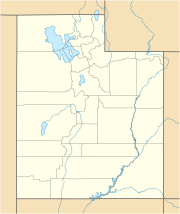This sandbox should only be used by The Utahraptor unless you get permission before editing the sandbox.
| Location | |
|---|---|
| Location | Beaver County |
| State | Utah |
| Country | United States |
| Coordinates | 38°26′59″N 113°16′32″W / 38.44972°N 113.27566°W |
| Production | |
| Products | Silver, lead, copper |
| Type | Shaft |
| History | |
| Discovered | 1875 |
| Opened | 1876 |
| Closed | 1933 |
| Owner | |
| Company | Horn Silver Mines, Inc. |
| Website | www |
The Horn Silver Mine is an abandoned mine in Beaver County, Utah, United States. Primarily a silver and lead mine, it also produced significant amounts of copper at the turn of the 20th century.
The mine was discovered in 1875 by Samuel Hawkes and James Ryan. In 1876, the mine was purchased for $25,000 by a group of men that included Allen G. Campbell and Matt Cullen, two prominent figures in Utah's history. A large deposit of silver-lead ore was quickly uncovered and the new owners began developing the mine in earnest. This led to the establishment of Frisco, Utah, a mining town located a mile north of the mine. In 1879, American financier Jay Cooke, along with New York capitalist Charles G. Francklyn, bought the Horn Silver Mine for the sum of $5,000,000, an unprecedented figure for a single mine at the time. Under Francklyn's management, the mine was put into mass production which saw the opening of a large cavern to extract the ore.
In February 1885, this large cavern caved in and prevented further development of the mine. The mine owners sunk a new shaft and began cautious development on a small scale. In 1887, the company's largest shareholder, Allan C. Washington, noticed that there was a significant amount of money not accounted for in the company's financial records. In 1887, it was revealed that Francklyn had embezzled over $600,000 from the company's treasury from 1881 to 1885. Washington gathered as many company shares as he could, and managed to take control of the company at the next meeting in 1888. Francklyn himself was involved in another scandal with the Cunard Line, which involved him embezzling millions of dollars from that company, and did not attend the meeting.
From 1888 to Washington's death in 1907, the Horn Silver Mine was managed with financial transparency and economic efficiency in mind. The new ownership built a concentration mill to process the previously unworked low-grade ores in the tailings, while new high grade ore bodies, including a substantial body of copper ore, was developed. The company released yearly reports showing expenditures, receipts, and income from the previous year in the local newspapers, most often the Salt Lake Daily Herald. When it was discovered that zinc deposits were located at the bottom of the mine, plans were put in place to process this vast resource.
Mining operations began to slow down after 1910. When the significant ore bodies were worked out, very few new strikes were made in the mine. The mine was worked intermittently until 1931, when large-scale production was again attempted. This only lasted two years; by 1933, the mine lay idle once more. Small scale production resumed during World War II, but the mine has not seen significant production since that time. In the 1970s, the present mining company, Horn Silver Mines Inc., purchased the property and has done annual assessment work on it ever since. The mine is currently located on private property, but several buildings from its historical production era remain standing in various stages of decay.
